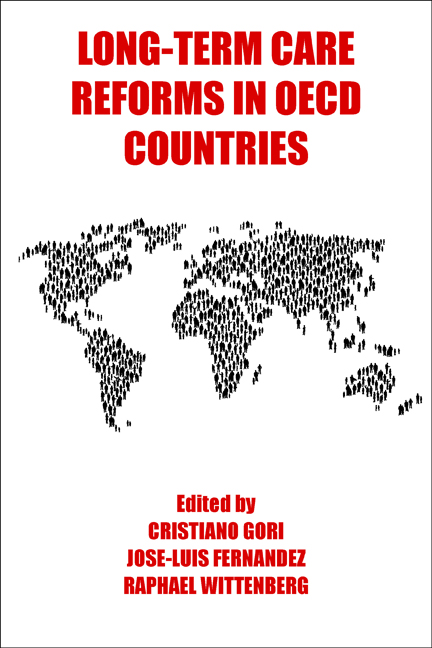Five - How different countries allocate long-term care resources to older users: changes over time
Published online by Cambridge University Press: 19 August 2022
Summary
Introduction
A key policy debate in long-term care (LTC) policies across OECD countries today can be summarised by the following question: what measures and strategies can be adopted to optimise resources? New policies are required for balancing finances and access to care, with different options on the table and waiting for governments’ decisions.
This chapter looks at changes over time in public resource allocation among LTC users in the same OECD countries considered in the previous chapter (except for Australia). As in Chapter Four, this chapter focuses exclusively on public care inputs, defined as those inputs that are (at least partially) publicly funded, and looks at users aged 65 and over. Chapter Four led the way to reconsidering how public resources are allocated in different LTC systems through an in-depth analysis of current spending. To complement that analysis, this chapter adopts a long-term perspective, investigating the changes that have occurred over the last 20–25 years in three crucial dimensions of resource allocation: the mix of LTC services for older people, their intensity, and their coverage.
The countries considered are representative of the OECD environment with respect to both the overall welfare models and the models of LTC policies. Concerning the former, as Campbell et al have noted in Chapter Four, ‘we have Sweden in social-democratic Northern Europe, Italy in familial Southern Europe, Germany in corporatist mid-continent, Australia, the US and England as quite different versions of the Anglo-Saxon “residual” model, and Japan as the relatively new entry that shares aspects of all the other models.’ From the point of view of LTC policies, the sample of countries selected represents the different models in the OECD context:
• Universal coverage within a single programme: this model guarantees people access to formal services without taking into account users’ income or assets as eligibility criteria. It is also organised as a single system, separated or integrated with the overall health system (Germany, Japan and Sweden).
• Mixed systems: in this case, LTC is provided through a mix of different universal programmes and benefits operating alongside, or a mix of universal and meanstested LTC entitlements (England and Italy).
• Means-tested systems: under this type of scheme, LTC coverage is provided through safety-net programmes. In countries using this system, income and/ or asset tests are used to define thresholds for eligibility to publicly funded care.
- Type
- Chapter
- Information
- Long-Term Care Reforms in OECD CountriesSuccesses and failures, pp. 77 - 116Publisher: Bristol University PressPrint publication year: 2015
- 1
- Cited by



